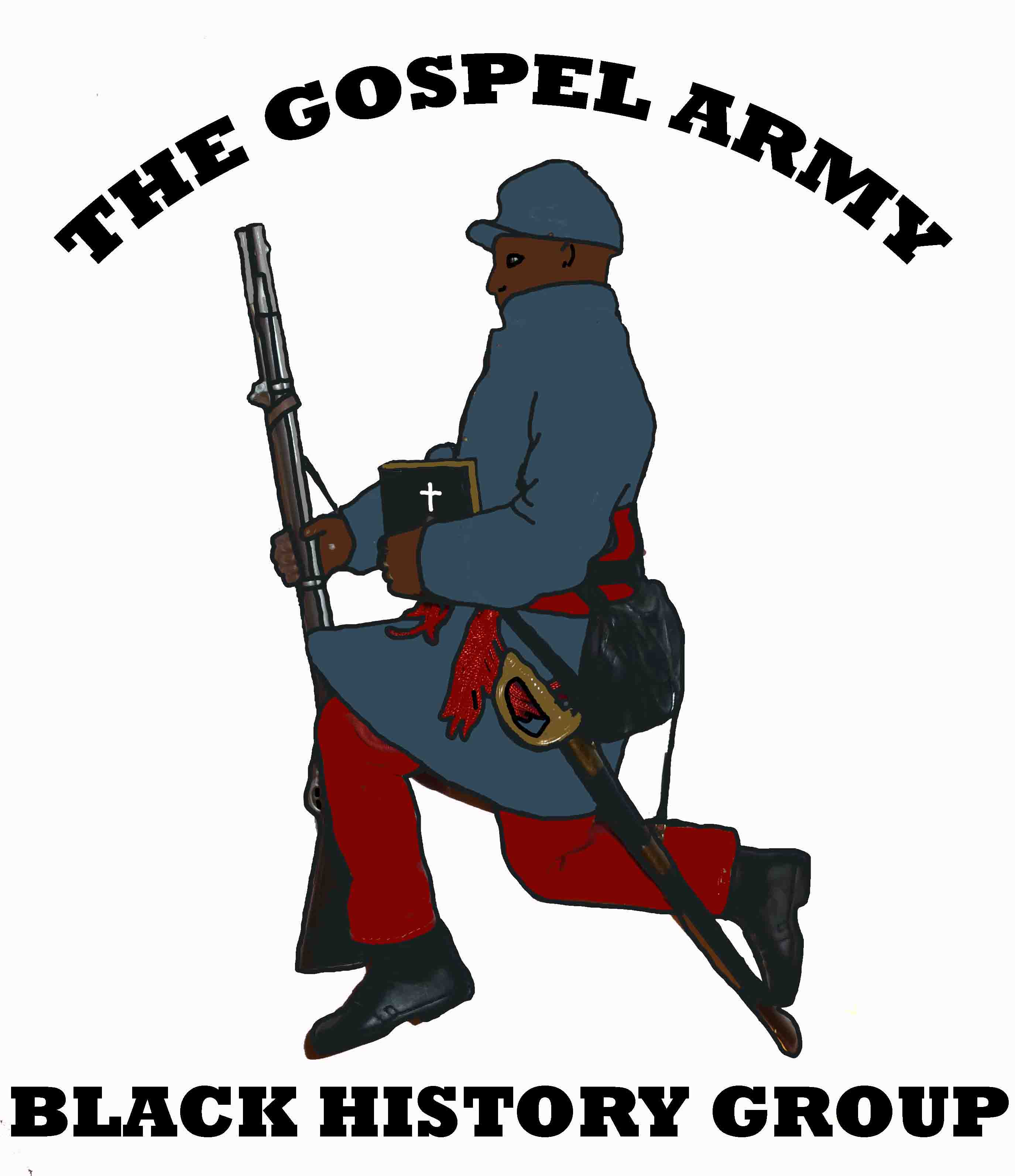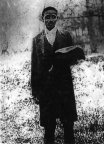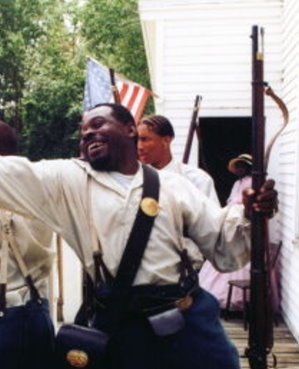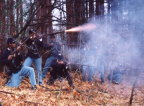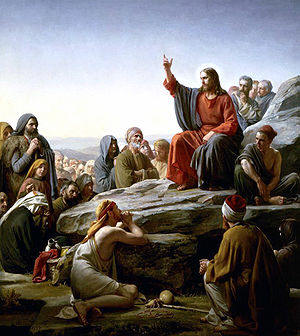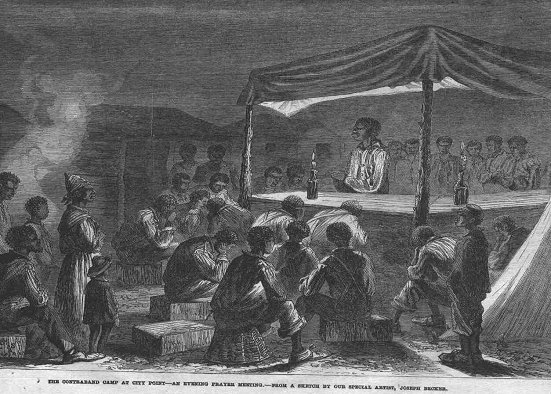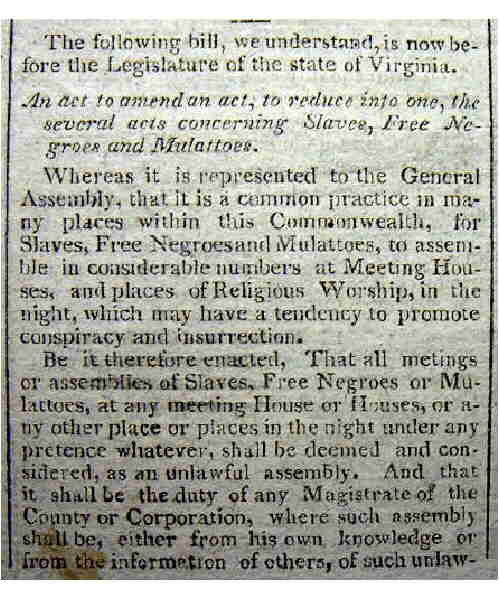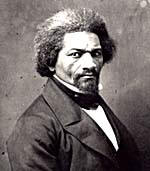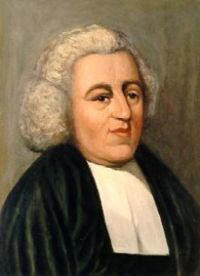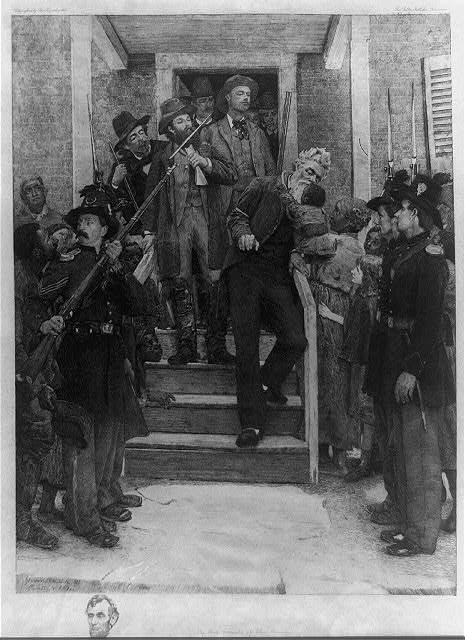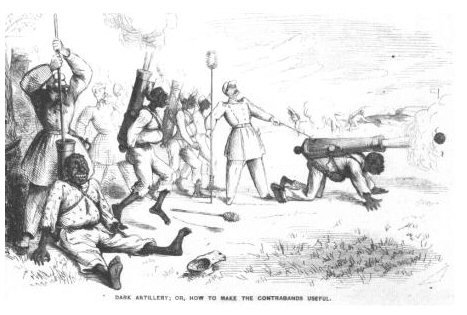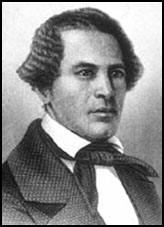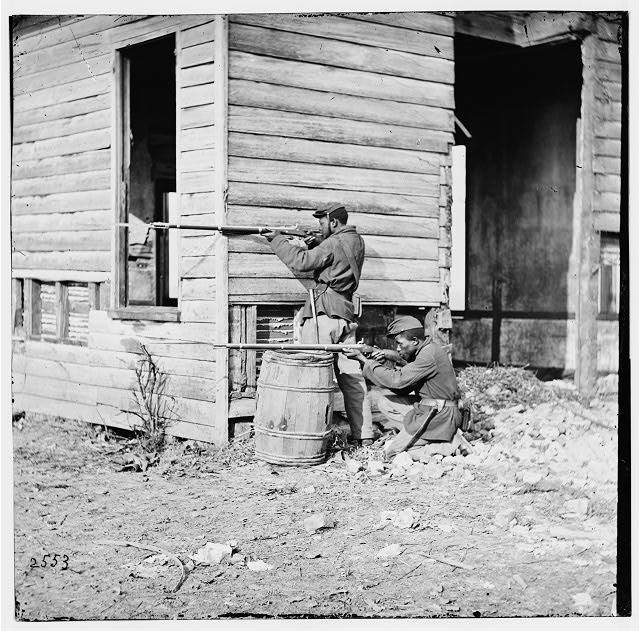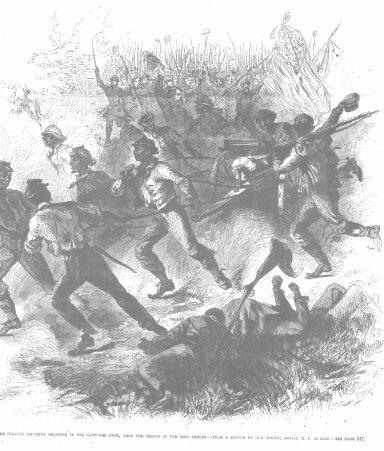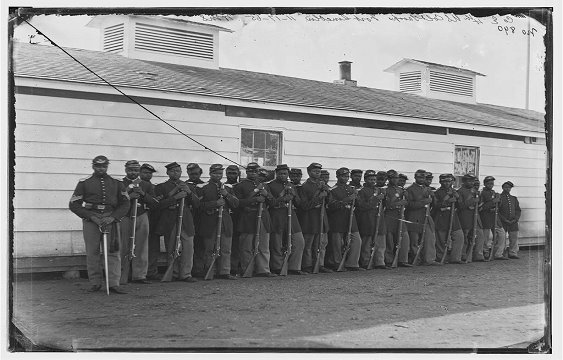
The
SACRED HISTORY OF THE NEGROES
|
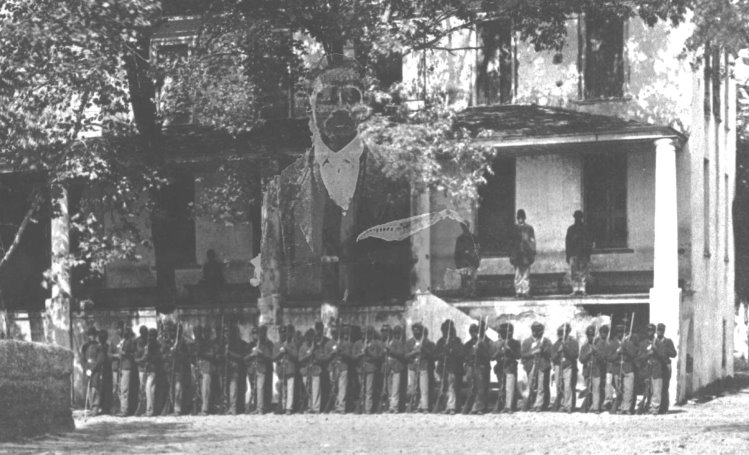
1st
South Carolina Volunteers (Colored) at Hilton Head S. Carolina & Rev.
Charley White
The 1st South Carolina Volunteers was the first black regiment to be formed during the Civil War. They felt that this was the time chosen by God for their deliverance from slavery and they called themselves "The Gospel Army."
MISSION
The mission of the Gospel Army Black History Group is to use Civil War era African-American history to teach basic teachings of Jesus Christ. Where there was hopelessness, Christ provide hope. Black history of this era however was distorted and hidden for financial gain. We are committed to assuring that the truth be told and recorded. This history relies on primary historical records rather than historian interpretations.
OUR MOTTO
When we treat others inhumanely, we destroy our own humanity and when we give hope to others, we serve God.
BACKGROUND
History is a source of pride, shame and
values. Achievements of the past can give us confidence for greater
achievements in the future. History teaches values such as courage,
determination and self-reliance. On the other hand, history that we are
ashamed of or history that does not support out interest is often
covered-up and hidden without any regard for the truth.
When
I discovered this history over 20 years ago, I was passionate about
sharing it with the African American community. I was asked the
question: ”why is this history important?” For many years, my
answer to that question has been: “because it is the truth.” Lately
however, I have started to question my response. History needs to
give us something that will improve our daily lives. This history
teaches us how to succeed and overcome hopelessness with faith in God.
I once
spoke to an adult black high school class about
an article on a cowardly black Civil
War soldier. I asked the class about the soldier’s motives and one young
lady responded that “it was hopeless.” I later discovered that she was
addicted to drugs and was aware of the feeling of hopelessness. I
responded that this was a racist article that appeared in a pro-slaver
newspaper. Black history was frequently distorted by raciest, the
cowardly black soldier never existed. This young lady had no spiritual
faith and saw her life as hopeless. Her only brief relief was drugs
which took her deeper into hopelessness.
Hopelessness is an
emotional state of being where our future looks as grim or worthless as
our present situation. Positive action is frequently substituted
with inaction, poor judgment, guilt, feelings of worthlessness and fear.
Poor judgment often leads to poor results and missed opportunities.
A means of escaping hopelessness is often sought with drugs, alcohol,
depression, crime and suicide.
Hopelessness played a major
role in American slavery. Slave owners wanted their slaves to not resist
slavery but believe that
they were meant to be slaves and lay the blame on themselves or their
identity. A slave without hope would not take any action to obtain freedom with any level
of determination. Racism was used to portray slave identity as cowardly, powerless and
in need of support by brave and honorable men. It was this well
published racist view that creates the current stigma of slavery. The
stigma of slavery discouraged many black men from the passivity
of Christianity. But I was amazed however, by the level of courage and
determination that African Americans displayed during the Civil War era.
These characteristics came from their faith and are cherished by all
Americans. African Americans had little power to improve their lives so
they turned to the power of God. The faith that they brought with them
from Africa was molded with Christianity in the heat of slavery. Their
faith gave them hope, peace and determination to change their lives.
Following the Battle of Port Hudson, a battle that black soldiers lost,
a writer wrote in the
New York Tribune “A race ready to
die thus was never yet retained in bondage, and never can be.” God
may not solve our problems for us but faith in him can give us the hope,
courage and determination that we need to improve our situation. Their
tenacity on the battlefield is a reflection of their faith and has
earned their faith respect.
I presented this history
in prisons where most of the inmates were black serving time for drug
related crime. I saw in them the hopelessness and the shame of slavery but the
material that I taught reminded me of the power of Jesus Christ. I told
them "when this place becomes a house of prayer, Jesus will come
and we will see the Promise Land." I
believe this today and it lies at the core of my ministry.
American values view slaves as
hopeless victims. Actions taken by blacks to win their freedom was down
played and not taught because equality in the south had significant
financial implications. Shame was used
to bind the minds of slaves like shackles bound their feet. That shame
was called "Nigger" and past down through generations to millions of
African Americans who continue to bare the shame of slavery. But Jesus
was also shamed. He wore a crown of thorns that caused suffering.
However, with the power of God, that thorny crown became more precious than
a jeweled crown. With the power of God the word Nigger can become a jeweled
crown. The Truth shall set us free but we may not have the required
courage to face or demons. With freedom comes self-reliance, an end of
victimization and the responsibility to free others. It is much easier
remain a victim.
This history is not just for African
Americans, people all over the world suffer from hopelessness and shame.
Once we are free it is our oblication like Harriet Tubman, to free
others. This history can
improve lives by helping us cope with hopelessness by supporting our
faith in prayer and the power of God. If you have a testimony, please
respond to
thegospelarmy@yahoo.com
and I will post it in the future.
Rev. John A. White Jr., President & Founder
Gospel Army
Black History Group
Little Known Black Civil War History Facts
-
All humans descended from people similar to the Bushmen of Africa and the use of prayer to control hopelessness is universal.
-
The word “nigger” was originally not derogatory nor an insult. It came from the English and German word for dark skin people, “neger” which means black in Latin.
-
Jesus ministered to the “undesirables,” the sick, the deformed, the oppressed and depressed. Slaves believed that they were the “Children of Israel” (Revolution 7:14.)
-
Slaves would frequently “steal away to Jesus” at night to pray in the woods and in slave trading yards. Black prayer meetings were illegal in the South and slaves were flogged or whipped when caught, because they prayed for freedom.
-
John Newton was a slave trader who was saved by grace and became one of the first abolitionist to speak out against slavery. His transformation is described in the hymn that he wrote: “Amazing Grace.”
-
John Brown was hung for executing his plan of arming the slaves.
-
With President Lincoln's support General Benjamin Butler successfully implemented John Brown's plan of Arming the Negroes. About General Butler
-
The first black Civil War regiment to be formed by freed slaves called themselves “The Gospel Army.” Their official name was “1st South Carolina Colored Volunteers.”
-
Harriet Tubman was the first woman to lead a Federal army into battle in the history of the United States.
-
There were 200,000 black soldiers fighting in 400 Civil War battles. 130 black regiments representing 7 Cavalry (7,000 men), 120 Infantry (100,000 men), 12 Heavy Artillery (12,000 men) and 10 Light Artillery (1,300 men).
-
On December 3, 1864 13,650 black troops were assigned to the 25th Corps making it the largest black army in the history of the United States.
-
Black Civil War Soldiers proved that “all men are created equal.” They won 14 Congressional Medals of Honor outside of the Confederate capital of Richmond Va. which remains as Africa-Americas most honored event. Black troops entered Richmond at the front of the Union Army.
-
The Fisk Jubilee Singers were former slaves who initially sang contemporary songs. When they sang the sacred spirituals of slavery they moved European royalty to tears.
The Power of Faith Came from Africa
The Bushmen of Africa
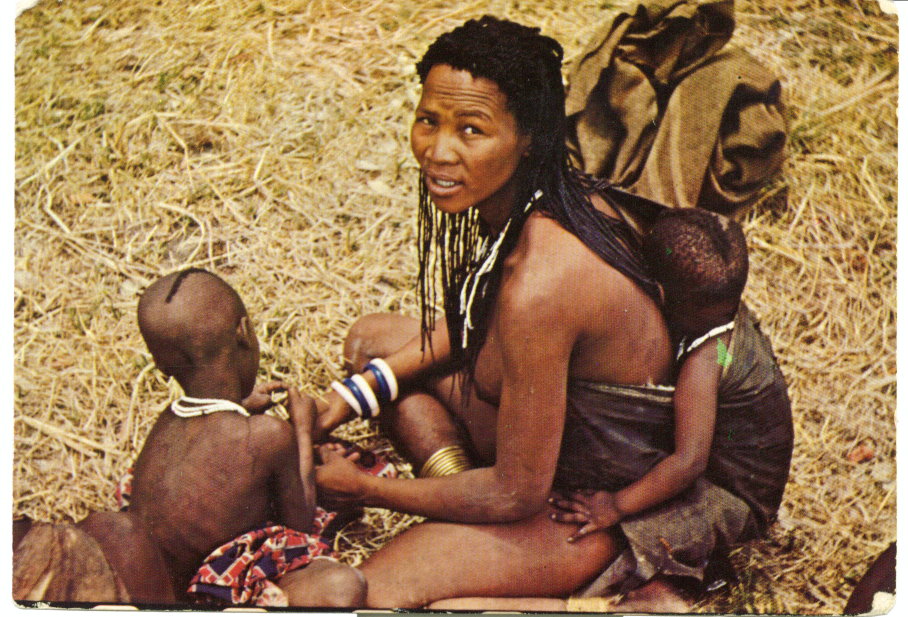
The tan color of the Bushmen (San) is similar to that of African
Americans who have both white and black ancestors
This story starts in Africa, the homeland of the human race. According to the Journey of Man DNA study the Bushmen or (San, “settlers” in Nama) of South Africa are thought to be the first descendents of the Human race and all other races are their descendents. In other words "Eve" resembled a Bushmen. YouTube: Journey of Man: A Genetic Odyssey
All humans can be differentiated by 13 genetic markers on the Y-chromosome. European ancestors left Africa in the second wave. Their trail led to Syria, the. Northwest to the area of the Balkans. From the Balkans they traveled to Central Asia where they split into several groups. One of these groups characterized by marker M174, traveled east to Europe. The other 12 markers such as skin color, reflect adaptation to climate as humans occupied various environments around the world. Dr Europeans would have the genetic markers of the Bushmen as well as M174.
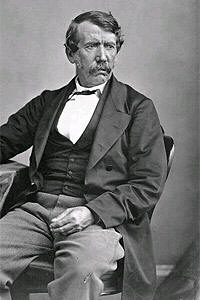 In
1886 Andrew Lang published a book called "Myth, Rituals and Religion."
Lang's book suggest that all religions share common elements, "
religious element of belief in a power that " makes for righteousness"
in this world and the next, and a mythical element." Lang obtained his
information from early explorers and missionaries such as David
Livingstone. Dr. David Livingstone was a Scottish missionary and
among the first white men to explore Africa. From 1840 to 1873, he
explored Africa from the Cape to the equator and from the Atlantic to
the Indian Ocean. Livingstone observed the religious practice of people
like the Bushmen long before they were in contact with white men. He
concluded that their reliance on prayer and the Power of God was similar
to his own. He said "they spoke in the same way of the direct influence
exercised by God in giving rain to the answer of prayers of the
rain-makers, and in granting deliverance in times of danger, as they do
now, before they ever heard of white men." Since all humans are
descendents of Bushmen type people it is assumed that reliance on prayer
and the Power of God was passed down from our early common ancestors.
This would explain why the practice of prayer and believe in God is
shared by all people all over the world.
In
1886 Andrew Lang published a book called "Myth, Rituals and Religion."
Lang's book suggest that all religions share common elements, "
religious element of belief in a power that " makes for righteousness"
in this world and the next, and a mythical element." Lang obtained his
information from early explorers and missionaries such as David
Livingstone. Dr. David Livingstone was a Scottish missionary and
among the first white men to explore Africa. From 1840 to 1873, he
explored Africa from the Cape to the equator and from the Atlantic to
the Indian Ocean. Livingstone observed the religious practice of people
like the Bushmen long before they were in contact with white men. He
concluded that their reliance on prayer and the Power of God was similar
to his own. He said "they spoke in the same way of the direct influence
exercised by God in giving rain to the answer of prayers of the
rain-makers, and in granting deliverance in times of danger, as they do
now, before they ever heard of white men." Since all humans are
descendents of Bushmen type people it is assumed that reliance on prayer
and the Power of God was passed down from our early common ancestors.
This would explain why the practice of prayer and believe in God is
shared by all people all over the world.
Dr. David Livingstone
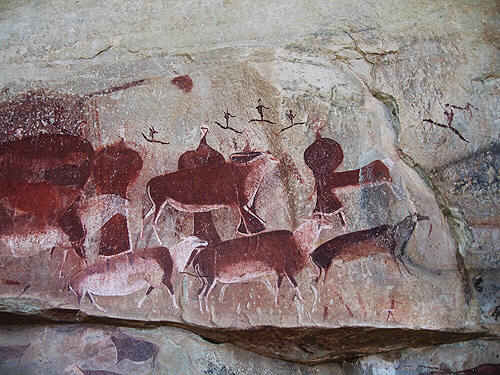 Bushmen
wall paintings of elands are thought to be 27,000 years old. Bushmen
were considered to be primitive people and early Europeans did not
believe that this could be the work of Bushmen. Bushmen however had a
practice of praying to an eland God Cagn,
" The
prayer
uttered by Qing, ' in a low imploring
voice,' ran thus: ' 0 Cagn, 0 Cagn, are we not your children? Do you not
see our hunger? Give us food.'"
Bushmen
wall paintings of elands are thought to be 27,000 years old. Bushmen
were considered to be primitive people and early Europeans did not
believe that this could be the work of Bushmen. Bushmen however had a
practice of praying to an eland God Cagn,
" The
prayer
uttered by Qing, ' in a low imploring
voice,' ran thus: ' 0 Cagn, 0 Cagn, are we not your children? Do you not
see our hunger? Give us food.'"
Multitude of eland
As humans migrated around the world the practice of worshiping animals was replaced by ancestor worshiping among many cultures. Ancestor worshipping is the practice of "those who have gone before" have a continual and beneficent interest in the affairs of the living." The Chinese, Egyptians, Romans, Malaysia, Polynesia practiced ancestral worship and it was also a common practice among West African tribes. African Americans are decedents of West Africans and traces of ancestor worshiping still remains in African American culture. Puff Daddy sang a song called "Ill be missing you" about his departed friend Notorious B.I.G. In this song BIG takes the place of a beloved ancestor residing in heaven. This song is similar to the prayer of Qing to the eland God Cagn. The song used old religious believes from Africa that touch the hearts of many people around the world. YouTube: Puff Daddy- I'll Be Missing You
The hopelessness of slavery started in Africa and is generally not studied in American history class rooms. "Roots" was the first movie to address African American Slave history, however slavers were portrayed as being "white." YouTube: Roots. The denial of African-Americans of the responsibility for enslavement is based on a feeling of victimization and powerlessness. This was not the case, Africa was controlled by powerful black tribes during slavery days. Slaves were frequently taken during war and traded for guns and European goods by powerful black tribes. General Butler asked a free black man if he would fight or not for the Union Army and he answered "General we come from a fighting race. Our fathers were brought here slaves because they were captured in war, and in hand to hand fights, too. We are willing to fight. Pardon me, General, but the only cowardly blood we have got in our veins is the white blood." White men did not enter the interior of Africa until slave trade was banned. It is only when we accept full responsibility for our condition that we acquire the the power to change our condition.
This article appeared in a 1954 American newspaper:
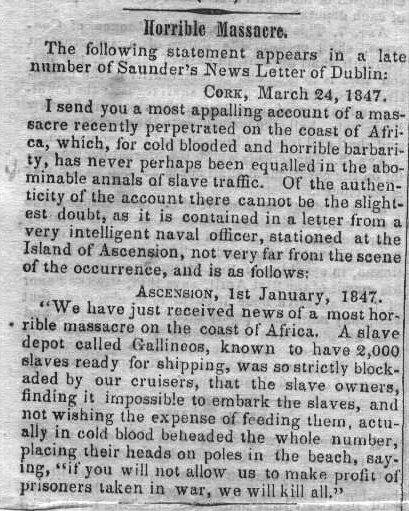
The WPA Writers Project
The voice of the slaves will be used to tell this story. The history of American slavery is best described by the people that experienced it. People are reluctant to talk about acts that they are ashamed of. Black universities such as Fisk University of Tennessee and Southern University of Louisiana were the first to see a need to document American slave history in 1929. At this time former slaves were in their seventies and it was important to get their prospective on slavery before they passed away. Only the White prospective of slavery was well known at that time. When the black perspective was revealed in the book “Uncle Tom’s Cabin” the country found itself plummeting towards a great Civil War as a result. During the Depression over 15 million people were unemployed. President Roosevelt responded with a project called the “New Deal” for economic recovery and social reform. The WPA was established to give the unemployed some work. Between 1936 and 1938, the WPA Federal Writers' Project (FWP) sent out-of-work writers in seventeen states to interview ordinary people in order to write down their life stories. Over 2000 interviews were made and compiled into seventeen volumes of Slave Narratives: A Folk History of Slavery in the United States from Interviews With Former Slaves.
"If you want Negro History, you will have to get it from somebody who wore the shoe, and by and by, from one to the other, you will get a book."
Mr. Reed, former slave, Bull Whip Days (Introduction)
Note the common and almost exclusive use of the word "nigger" by former slaves to refer to slaves. The American Heritage Dictionary of the English Language defines a nigger as “A Negro or member of any dark-skinned people. An offensive term used derogatory. [Earlier English dialectal neeger, neger, from French negre, from Spanish Negro, Negro.] The German's and English used the Latin term "neger" to describe the dark skin people of Africa near the equator, which means black. The term was originally not derogatory, it referred to a race of people. Since most African Americans were slaves the term meant black slave, however American slavery was dehumanizing. Apparently the English word neeger was derived from Latin and meant black. As blacks became free racist continued to use the word to remind blacks of their identity, that they were descendents of slaves and less than white. Nigger became an identity as opposed to a race identification. The Spanish word for black is "Negro" which was not derogatory. Spanish slavery was less influenced by racism than American slavery and was not dehumanizing. When Eliza Evens was freed from slavery she obtained a last name and her identity transformed from nigger to Negro.
“One time, some Yankee soldiers stopped and started talking to me. One asked me what my name was. I say, "Liza," and he say, "Liza who?" I thought a minute and I shook my head, "Jest Liza. I ain't got no other name. " He say, "Who live up yonder in dat big house!" I say, "Mr. John Mixon. " He say, "You are Liza Mixon. " Den he say, "Do anybody ever call you 'nigger'?" And I say, "Yes, Sir. " He say, "Next time anybody .call you 'nigger, ' you tell 'em dat you is a Negro and your name is Miss Liza Mixon. " The more I thought of that, the more I liked it, and I made up my mind to do jest what he told me to. My job was minding the calves, while the cows was being milked. One evening, I was minding the calves and Old Master come along. He say, "What you doin', nigger?" say real pert like, "I ain't no nigger, I's a Negro, and I'm Miss Liza Mixon. " Old Master sho' was Surprised, and he picks up a switch and starts at me. Law', but I was skeered! I hadn't never had no whipping, so I run fast as I can to Grandma Gracie.” I hid behind her, and she say, whats the matter wid you, child?” And I say, Master John gwine whip me.” Sha say she know better, and ‘bout that time Master John got there. He say, “Gracie, dat little nigger sassed me.” She say, “Lawsie, child, what does ail you?” I told them what the Yankee soldier told me to say, and Grandma Gracie took my dress and lifted it over my head and pins my hands inside, and Lawsie, how she whipped me, and I dassen’t holler loud either. I jest said dat to de wrong person, didn’t I?
-Eliza Evens, Bull Whip Days, p341
Master John Mixon knew Eliza's name, yet he called her "nigger" which dehumanized her and made her an object. White people used the word in this form to dehumanize. This is why blacks are intolerant of the word being used by whites.
Non-racist whites seldom used the word nigger. White officers that led black men in the Civil War (USCT) were the most intelligent men in the army because they were given test for their position. In a letter to his mother a Union officer reveals the respect that black Civil War soldiers earned from their Confederate foes. He wrote: "I have talked with numbers of Paroled Prisoners in Vicksburg, and they all admit it was the hardest stroke that there cause has received-the arming of the negrow. Not a few of them told me that they would rather fight two Regiments of White Soldiers than one of Niggers." Confederate soldiers were among the first to give respect to black soldiers and here the word nigger has its original meaning.
The word nigger meant slave and a slave was submissive to white people. Black soldiers did not consider themselves as slaves but as men committed to principles. A racist Union officer tried to use the word nigger to stop a black guard from doing his job by reducing his authority.
"In a compariable incident, a captain in USCT tried to sneak out of camp without proper authorization. When the guard refused to let him pass, the captain threatened to "shoot you, you damned nigger." The corporal forcefully responded that he was not a "nigger" but "a Federal soldier and wear the Federal uniform. I have taken the same oath that you have," he insist. Again, a general court-martial dismissed the captain from the service."
J. T. Glatthaar, Forged in Battle, p90
Many white Union soldiers had racist attitudes. At Millikens Bend on June 7, 1863, some Illinois cavalrymen observed black Civil War soldiers and sneered, "A man ud be a dam fool to try to make soldiers out ah niggers. . . . Any one ough to Know a nigger wont fight: they'r running now. before they seen a reb. . . . We will show them how it is done if we find any of them." Several minutes later the Illinois horsemen raced past in retreat, pursued closely by the Confederates. The black company then rose up and delivered a volley that drove the Rebels back and saved the day."
( J. T. Glatthaar, Forged in Battle)

The seed of slavery was war between African tribes, black men enslaving
black men.
Slavery was hopeless and without hope, death quickly follows. Slaves chained together from Tennessee chose death over Delta slavery.
“As they walked together, they talked about their future, and they all agreed that death would be preferable to the living death of the cotton fields. And they decided that the first time they had to ferry across a river with the nigger trader, they would walk onto the Ferryboat and keep right on walking till they had walked off the other end. At the end of Dr. Sneed's farm was a ferry to carry people over to the Macabee farm on the other side, and when the nigger trader drove those slaves onto the ferry, that is exactly what they did: they all walked 'off into the deep of the river at the other end. If there was any among them who was lukewarm he was shoved in by the ones behind him.”
Rachel Cruze Strawberry Plains, Knox County, Tennessee,
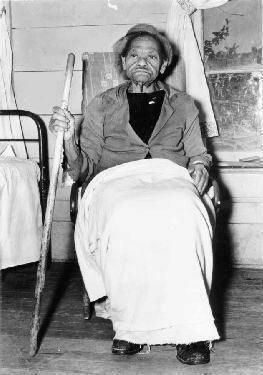 A
slave may not feel that their life is worthless and a person with every
thing to live for may feel that their life is worthless.
The
Mary
Reynolds
narrative is one of the most descriptive narrative of slavery that was
recorded.
Mary Reynolds was a slave owned by Dr. Kilpatrick and she was adored by
Kilpatrick's daughter Sara. Following the death of Sara's mother both
girls were the same age and were nursed by Mary's mother. The two girls
played together and formed an uncommon bond. Kilpatrick tried to break
the bond between the two girls by selling Mary. Sara felt like her life
was worthless and she lost the will to live.
A
slave may not feel that their life is worthless and a person with every
thing to live for may feel that their life is worthless.
The
Mary
Reynolds
narrative is one of the most descriptive narrative of slavery that was
recorded.
Mary Reynolds was a slave owned by Dr. Kilpatrick and she was adored by
Kilpatrick's daughter Sara. Following the death of Sara's mother both
girls were the same age and were nursed by Mary's mother. The two girls
played together and formed an uncommon bond. Kilpatrick tried to break
the bond between the two girls by selling Mary. Sara felt like her life
was worthless and she lost the will to live.
"Miss Sara pined and sickened. Massa done what he could, but they wasn't
no peartness in her. She got sicker and sicker, and massa brung nother
doctor. He say, You li'l gal is grievin' the life out her body and she
sho' gwine die iffen you don't do somethin' bout it.' Miss Sara says
over and over, I wants Mary.' Massa say to the doctor, That a li'l
nigger young'un I done sold.' The doctor tells him he better git me back
iffen he wants to save the life of his child. Dr. Kilpatrick has to give
a big plenty more to git me back than what he sold me for, but Miss Sara
plumps up right off and grows into fine health."
Mary Reynolds
What do you do when life is so hard so hard that you can not bare it? Mary's ancestors taught them to seek the Power of God.
“He didn't like for us niggers to pray, either. We never heared of no church, but us have prayin' in the cabins. We'd set on the floor and pray with our heads down low and sing low, but if the foreman heared he'd come and beat on the wall with the stock of his whip. He'd say, "I'll come in there and tear the hide off you back. But some the old niggers tell us we got to pray to God that he don't think different of the blacks and the whites"
Mary Reynolds
Millions of slaves survived the Delta slavery experience. Slaves were not allowed to read or write however, the source of their inner strength, their faith was recorded in their music and passed down to their descendents. Rev. John P. Kee said "In this life every body shall have a valley experience, but those that hold on to God know that while they are going through, Jesus will never leave you or forsake you." Had they held on, these slaves would have found "a Lilly in the valley, brighter than the morning sun."
The Gospel of Jesus Christ
‘The
one who takes the least or lowest place among you is the greatest.'
Jesus Christ,
Luke 9:48
Today we value wealth but we must remember that Jesus ministered to the “undesirables.” Jesus accepted those that were discarded and disliked by the tribe. They were considered worthless and felt hopeless. Jesus gave comfort to the lame, the blind, the sick, the deformed and the informant. Jesus was not in good favor with the aristocrats of the temple. Recall that the ancestors of slaves were from West Africa and commonly practiced ancestor worship. Due to the practice of breaking up slave families by selling slaves, it was not unusual for slaves to not know their ancestors or parents. In her book “Trabelin' On The Slave Journey to an Afro-Baptist Faith.” historian Mechal Sobel says that Jesus replaced their ancestors in the role of providing protection and guidance.
In the Sermon on the Mound Jesus gave hope to the hopeless. The Slave Narratives are used here to support and teach the Gospel of Jesus Christ.
Now when he saw the crowds, he went up on a mountainside and sat
down. His disciples came and he began to teach them saying:
3 Blessed are the
poor in spirit, for theirs is the kingdom of heaven.
4 Blessed are those who mourn, for they will be comforted.
5 Blessed are the meek, for they will inherit the earth.
6 Blessed are those who hunger and thirst for righteousness, for they
will be filled.
7 Blessed are the merciful, for they will
be shown mercy.
8 Blessed are the pure in heart, for they will see God.
9 Blessed are the peacemakers, for they will
be called sons of God.
10 Blessed are those who are persecuted because of righteousness, for
theirs is the kingdom of heaven
11 Blessed are you when people insult you, persecute you and falsely say
all kinds of evil against you because of me. 12 Rejoice and be glad,
because great is your reward in heaven, for in the same way they
persecuted the prophets who were before you.
. Families were frequently broken up during slavery days. Family members were frequently sold before death, which weakened the bond between the living and their dead ancestors. For example, in a letter to a friend the author wrote “I once heard a slave trader say; he had sold a woman who had nine children, but gotten in awful wedlock by nine different husbands, having been sold all that many times, and married in each place she went.” (USCT Civil War Digest, Vol. 7 No.2, reprint from Angelo African, March 26, 1864). Traditionally West Africans tribes worshiped ancestors in heaven but that bond was completely destroyed by slavery so African Americans sought a replacement for their ancestors in Heaven.
In the book “Trabelin' On The Slave Journey to an Afro-Baptist Faith.” historian Dr. Mechal Sobel described the transition from the slaves African faith to that of the Afro-American Christian faith. Sobel was not an American and had a some what objective and remote view of the African American experience. The slaves replaced the ancestor role with Jesus, who was far more consistent and reliable. Jesus Christ became the slave’s personal protector and he took the place of the living dead or ancestors that resided in heaven. The bond or relationship between the slave and Jesus tended to be an intimate one.
" Jesus became the rock and the salvation of the black man. The role the living dead had played in being concerned for their kin was taken over by Jesus, who was a far more reliable spirit. Blacks turned to him in joy and in sorrow:"
Trabelin' On The Slave Journey to an Afro-Baptist Faith p125
STEAL AWAY TO JESUS
YouTube: Negro spirituals
YouTube: Steal Away - Reverend Pearly Brown
There was a difference between plantation slave church services and slave religious practices. Plantation church served the interest of slave owners and emphasized that slaves serve their masters. This religion provided little spiritual lifting and hope to slaves. However, many slaves serviced the Delta experience by relying on the power of prayer. Secret prayer meetings addressed the spiritual needs of the slaves. These religious practices were illegal throughout the South because they prayed for freedom.
"Some Sundays we went to church some place. We allus liked to go any place. A white preacher allus told us to 'bey our masters and work hard and sing and when we die we go to Heaven. Marse Tom didn't mind us singin' in our cabins at night, but we better not let him cotch us prayin'."
"Seems like niggers jus' got to pray. Half they life am in prayin'. Some nigger take turn 'bout to watch and see if Marse Tom anyways 'bout, then they circle theyselves on the floor in the cabin and pray. They git to moanin' low and gentle, 'Some day, some day, some day, this yoke gwine be lifted offen our shoulders.'
William Moore, Selma Alabama/Limestone County Texas, Bull Whip Days pg 332
"We used to steal off to de woods and have church, like de spirit moved us--sing and pray to our own liking and soul satisfaction and we sure did have good meetings, honey-baptize in de river, like God said. We had dem spirit-filled meetings at night on de bank of de river, and God met us dere. We was quiet 'nuf so de white folks didn't know we was dere, and what a glorious time We did have in de Lord."
SUSAN RHODES, BULLWHIP DAYS, p194
"I've heard 'em pray for freedom. I thought it was foolishness, then but the old-time folks always felt they was to be free. It must have been something 'vealed unto 'em. Back then, if they'd catch you writing, they would cut off your finger, but still the old-time folks knew they would he free. It must have beer 'vealed unto 'em."
-- ANONYMOUS
Kathleen Battle - Swing Low Sweet Chariot - Boys Choir of Ha
The Children of
Israel
Dr. Sobel also claimed that although the slave lost their identity when enslaved, they found a new identity in the Bible. They believed they were the Children of Israel. Sobel wrote:
" Bible history-the history of Israel, of the Hebrew slaves and their redemption-became the black Baptist's sacred past. They themselves felt as if they were of the seed of Abraham, and biblical "space" became their sacred topography. They would go home to Heaven, as African spirits went home to Africa ("Gonna make heaven my home"), and they would find mother, father, and kinfolk there waiting."
. Mechal Sobel, Trabelin' On The Slave Journey
It was a wide spread believe throughout the South among black slaves that they were the Children of Israel. Referring to the church congregation as "children" still occurs in black churches today. Dr. Martin Luther King Jr. revived this theme when he spoke of reaching "The Promise Land." YouTube: Martin Luther King Junior's Historic Last Speech. In this speech Dr. King also said "Mine eyes have seen the glory of the coming of the Lord." This is the first verse of the "The Battle Hymn of the Republic,” a song inspired by John Brown. Slaves chose the biblical identity of the Children of Israel because that identity gave them hope.
“Us niggers didn't have no secret mettin's. All us had was church meetin's in Arbors woods. De preachers 'ud exhort us dat us was de chillun o' Israel in de wilderness an' de Lawd done sent us to take dis lan' o' milk an' honey. “
Charlie Davenport, Bull Whip Days, p377
In the Mary Reynolds narrative she said that they prayed for the end of "tribulation." The word “tribulation” occurs only in the Book of Revelation 7:2-14. This chapter describes a people composed of many tribes that speak many tongues and who's clothes are washed white by the blood of the lamb. They came out of tribulation and God washed the tears from their eyes.
..."Once my maw and paw taken me and Katherine after night to slip to ‘nother place to a prayin’-and-singing’. A nigger man with a white beard told us a day am comin’ when niggers only be slaves of God . We prays for the end of trib’lation and the end of beating’s and for shoes that fit out feet. "
This history was forbidden to be told by slaves during slavery so stories uncomplimentary to slave owners were modified. The Pilgrim Jubilees tell a story of a little girl that was forbidden by her father from going to church. She slipped away to Jesus and was beaten by her father until her clothes was covered with blood. She asked her mother to save those clothes and show them to Jesus, so he could see the blood that she shed for him. Perhaps, this was perceived as the "blood of the lamb" Revelation 7:2-14. It is difficult to hear but it is on YouTube: The Pilgrim Jubilees - A Child's Blood (Precious Lord)
Book of Revelation 7:9-16
[9] After this I looked, and behold, a great multitude which no man
could number, from every nation, from all tribes and peoples and
tongues, standing before the throne and before the Lamb, clothed in
white robes, with palm branches in their hands,
[13] Then one of the
elders addressed me, saying, "Who are these, clothed in white robes, and
whence have they come?"
[14] I said to him, "Sir, you know." And he said to me, "These are they
who have come out of the great tribulation; they have washed their robes
and made them white in the blood of the Lamb.
[15] Therefore are they
before the throne of God, and serve him day and night within his temple;
and he who sits upon the throne will shelter them with his presence.
[16] They shall hunger no more, neither thirst any more; the sun shall
not strike them, nor any scorching heat.
Do you want a revolution?
Kirt Franklin revealed the Bible passage Revelation 7:2-14 in his
song "Revolution."
YouTube: Kirk Franklin -
Revolution
The Gospel Army Black History Group, has presented this material in churches, schools and businesses. Our purpose however has never been sharper or more focused than when we presented this material in prisons. Today there are more African American young men in jails than college. Most of this incarceration is an effect of drug abuse. Many young black men have little spiritual support and turn to drugs to help them cope with their environment.
Africa-American Work Songs in Texas is a view of slavery. The film includes dogs, patrollers, horses and chains. Again, their souls are revealed in their music.
YouTube: Negro Prison Songs / "Rosie"1947 [RARE]
NEGRO PRAYER MEETINGS BANNED
New York Herald Saturday, January 28, 1804
House slaves tended to be more loyal to their owners than to the field slaves from which they had come from. The penalty of participating in prayer meetings was flogging or whipping. Apparently, slave owners feared these prayer meetings.
“ Marse Carter had a house gal by de name uf Frances, an' she had wait on de white folks all day long, an' when night wud come, he made her slip out 'mongst de slaves an' see what dey wuz doin' an' talkin' 'bout.
My mammy wus livin' wid 'nudder man, named Joe, an' one night Joe an' my Mammy an' some more slaves wuz down on deir knees prayin' fur de good Lord to sot dem free, an' Frances wus slippin' round de corner uf de house an' heard what dey wus sayin'. An' she goes back to de house an ' tells de old marse, an ' he sent de oberseer down dar an ' brung ebery one uf dem to de stake, an' tied dem, an' whipped dem so hard dat blood come from some uf dems backs”
July Halfen, Bullwhip Days, p196
CALLING THE LORD IS BANNED
American slaves frequently called on Jesus in times of trouble and apparently continued the practice long after slavery. This was a combination of both Christian and African practices. “Lord is Lord of all and richly blesses all who call on him, 13for, "Everyone who calls on the name of the Lord will be saved."[1] Romans 10
Apparently slave masters and overseers were not comfortable with slaves calling on the Lord while they were whipping them so the slave was forbidden in this case from “calling on the Lord.”
Dey wouldn't allow 'em to call on de Lord when dey were whippin' 'em, but dey let 'em say, "Oh, pray! Oh, pray, Marster!" Dey would say, "Are you goin' to work? Are you goin' visitin' widout a pass? Are you goin' to run away?" Dese is de things dey would ax him , when dey wuz whippin' him.
Alex Woods, Raleigh, North Carolina, Bull Whip Days, p244
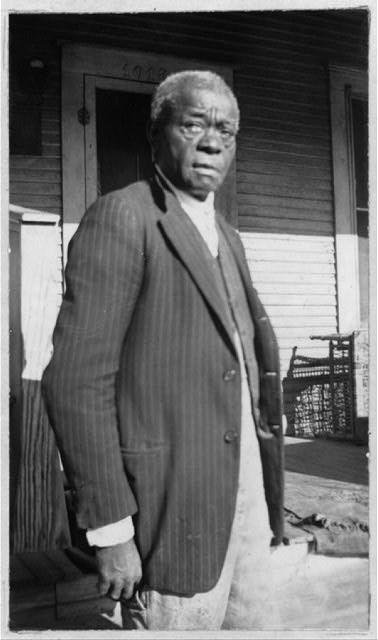 Note that in the following narrative, William Moore was from Texas and
Alex Woods was from North Carolina. The large separation in distance
between them suggest that saying “pray” instead of “Lord” was not
an isolated practice during whippings.
Note that in the following narrative, William Moore was from Texas and
Alex Woods was from North Carolina. The large separation in distance
between them suggest that saying “pray” instead of “Lord” was not
an isolated practice during whippings.
“ One day, I am down in the hog pen riling the hogs and teasing them like any yearling boy will do, when I hear a loud agony screaming up to the house. I can't make out who 'tis. I'm curious and I start up to the house and I hear, "Pray Marse Tom. Pray, Marse Tom. " But still I can't tell who 'tis. When I get up close I see Marse Tom got my mammy tied to a tree with hir clothes pulled down and he is laying it on her with a bullwhip and de blood is running down her eyes and off her back.
I goes crazy. I say, "Stop, Marse Tom, " and he swings the whip and it don't reach me good, but it cuts just the same. I sees Miss Mary standing in the cook house door. I run aryund crazy like, and I see a big rock and I take it and I throw it and it ketches Marse Tom in the skull and he goes down like a poled ox.”
William Moore, Selma Alabama/Limestone County Texas, Bull Whip Days pg 332
Slave Auctions
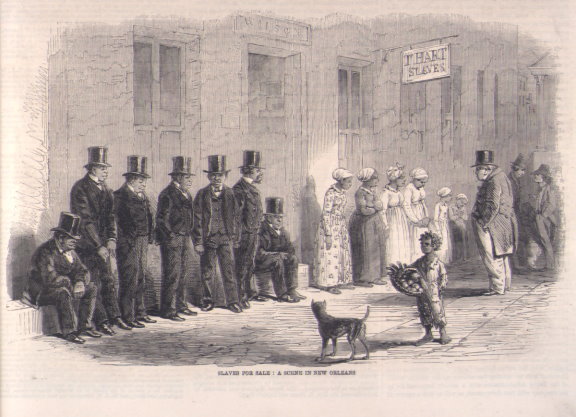 <<<
<<<Slave Trade of house slaves was performed in the city of New Orleans. Field slaves were traded however, across the Mississippi River. Slave prayer meetings were strictly prohibited and violators were whipped. The auction is the darkest and most depressing part of Black History. The auction is the epitome of helplessness and victimization. Stephen Williams shares the experience of being auctioned in a New Orleans slave trading yard. Stephen's mama however, was a "very very religious women". The night
after her daughter was sold, she violated yard rules by praying with others, then voluntarily admitted her guilt.
"I rec'lec', the night after Mary is sold away from us, the colored
folks in the trader yard hold prayer meeting. Mama was very
religious-very religious--and it ever a soul went to Heaven, hers did.
Seems like Major Long was gone that evening, and Mama and some
more of the folks in the yard got together for a praying time. Didn't
do no singing, 'cause that would have 'tracted attention, and the
major didn't 'low no meetings. But someone saw the folks prayin
and told him the next morning, and he come out in the yard with a
cat-o'-nine-tails and rounds everybody up. Then, he said, "You niggers
what was praying last night, step out here.
None come out,
though, 'cept Mama, 'cause they was 'fraid they was going to get
whipped Major said to Mama, "Well, you are the only truthful one
in the yard, and I won't whip you, 'cause you have been truthful.
I'll see if I can keep you and your man and your other children
together and not see you separate." Mama jes' fell on her knees
and thanked the good Lord right in front of the major, and he
never touched her with his whip."
YouTube: I Don't Feel no Ways Tired by Rev. James Cleveland
I can say what that mother said that night:
I ain't no ways tired, Lord
I’ve
come too far, from where I started from
No body told me, the road would be easy
I don’t believe he would take me this far and just leave me.
Frederick Douglass had the enormous task of convincing the world of the evils of American slavery. But first he must convince the world that all men are equal and basically the same. Slavery dehumanized the slave and Douglass had to remind the world that slaves were people. He chose to use a common trait between the races, which is the need to love and be loved. The following is taken from a speech that he delivered to the British people while he was exiled to England. If Toni Braxton had been available, she would have helped him out by singing "Breathe Again."
YouTube: Toni Braxton - Breathe again
May 2, 1846
"The woman was placed on the auctioneer's block; her limbs, as is customary, were brutally exposed to the purchasers, who examined her with all the freedom with which they would examine a horse. There stood the husband, powerless; no right to his wife; the master's right preeminent. She was sold. He was next brought to the auctioneer's block. His eyes followed his wife in the distance; and he looked beseechingly, imploringly, to the man that had bought his wife to buy him also. But he was at length bid off to another person. He was about to be separated forever from her whom he loved. No word of his, no word of his, could save him from this separation. He asked permission of his new master to go and take the hand of his wife at parting. It was denied him. In the agony of his soul he rushed from the man who had just bought him, that he might take a farewell of his wife; but his way was obstructed, he was struck over the head with a loaded whip, and was held for a moment; but his agony was great. When he was let go, he fell a corpse at the feet of his master. His heart was broken. Such scenes are the every-day fruits of American slavery. "
Frederick Douglass
Life and writings of Frederick Douglass, Early Years, 1817-1849, Appeal to the British People, p158-9
Ideal Slavery
Life on Mary Reynolds plantation was hard, but Georgia Baker’s memories of slavery on Alex Stephens plantation was the opposite. Her master was Alex Stephens the Vice President of the Confederacy and he represented the ideal slave master. He treated his slaves as family. They were well fed, well dressed, had comfortable living quarters and were treated with respect. Georgia Baker was interviewed during the depression. She had little to eat and she lived in deteriorated housing. It was experiences like Georgia Baker that promoted slavery while Mary Reynolds experience condemned slavery
Amazing Grace
“No one can slave for two masters; for either he will hate the one and love the other, or he will stick to the one and despise the other. You can not slave for God and for riches." (Matthew 6:24)
YouTube: The Story of Amazing Grace
John Newton was a slave trader and treated slaves inhumanely. However, he was saved by God's grace and became one of the first abolitionist to speak out against slavery. Newton wrote the story of his conversion in the most popular hymn ever written, "Amazing Grace." This song should have special meaning to poor blacks.
“The University of New Jersey offered a honorary Doctor of Divinity to Newton and he said that ‘the dreary coast of Africa had been his university and he would never accept any diploma ‘except from the poor blacks’“
YouTube: Amazing Grace - Wintley Phipps
YouTube: Leann Rimes -
Amazing Grace
YouTube: Mahalia Jackson- Amazing Grace
"Mine eyes have seen the glory of the coming of the Lord"
Hopelessness results in inaction and with out action our condition will not change. God can give us the courage, determination and faith required to think that change is possible. In other words God gives us hope if we have faith. John Brown felt that action was required to eliminate slavery and that action was war. John Brown was so opposed to slavery that he was kicked out of the state of Kansas over the issue. With a small army of five blacks, thirteen whites (including two of his sons) and a wagon load of arms, he attempted to end slavery by arming the slaves.
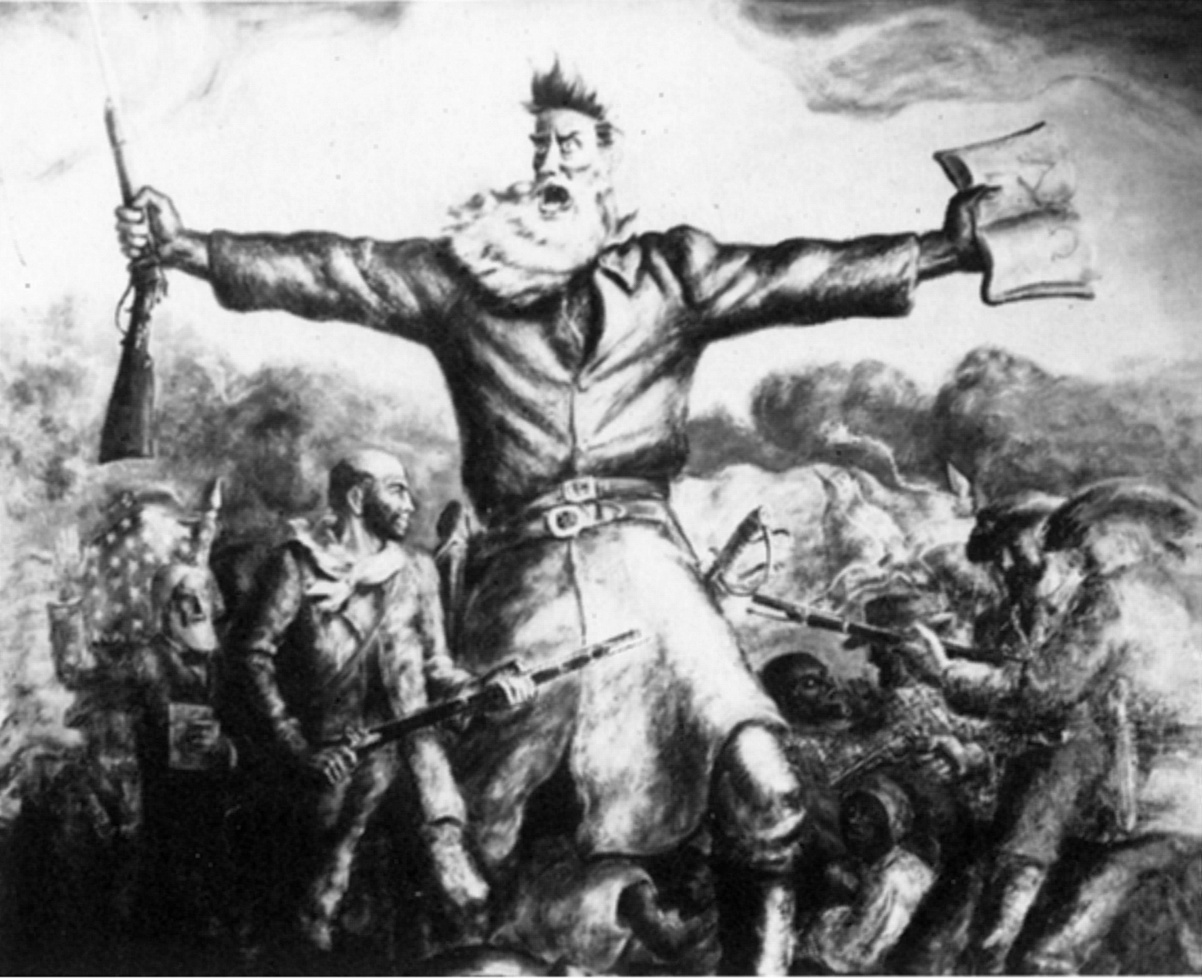
With his "Bible in one hand and his musket in the other" John Brown
is frequently attributed with starting the Civil War. This theme is
included in a "Soldiers Prayer"
by a member of the Gospel Army.
"I have been whipped, as the saying is," Brown acknowledged to his wife, "but I am sure I can recover all the lost capital occasioned by that disaster; by only hanging a few moments by the neck; and I feel quite determined to make the utmost possible out of a defeat."
The legend of John Brown's hanging says that he stopped to kiss a "negro child" on the way to the gallows.
The "Last Moments of John Brown" by Thomas Hovenden
John Brown of
Ossawatomie, they led him out to die:
And lo! a poor slave mother with her little child
pressed high,
Then the bold blue eye grew tender, and the old harsh
face grew mild,
As he stopped between the jeering ranks and
kissed the Negro's child!
Picture Album
Negro Americans in the Civil War
C. H. Westly
There was a "secret six" of abolitionists that supported John Brown's raid. One of these men was Col. T. W. Higginson who later led "The First South Carolina Volunteers." They called themselves "The Gospel Army" and were the first ex-slave regiment organized during the Civil War. Another of the abolitionists that supported John Brown was Samuel Howe. His wife Julia Howe rewrote "John Brown's Body" to become "The Battle Hymn of the Republic” which acted as the American National anthem until 1931. She said that the words came to her in a dream.
In Martin Luther King Junior's Historic Last Speech Dr. King said "Mine eyes have seen the glory of the coming of the Lord."
The Battle Hymn of the Republic
Mine eyes have seen the
glory of the coming of the Lord.
He is trampling out the vintage
where the grapes of wrath are stored;
He hath loosed the fateful
lightning of his terrible swift sword:
His truth is marching on
Chorus:
Glory Hally,
Hallelujah!
Glory Hally, Hallelujah!
Glory Hally, Hallelujah!
His truth is marching on
In the beauty of the
lillies Christ was born across the sea,
With a glory in his bosom
that transfigures you and me:
As he died to make men holy, let us die
to make men free,
While God is marching on
Chorus:
Glory Hally,
Hallelujah!
Glory Hally, Hallelujah!
Glory Hally, Hallelujah!
His truth is marching on
YouTube: The Battle Hymn of the Republic, Judy Garland
Most people in the North as well as the South believed that slaves would not fight for their freedom. This was the whole basis of racism and the primary principle that the Confederacy fought to uphold and protect.
In a debate to allow the formation of black regiments in the Confederacy, General Cobb made the Southern view of slaves clear when he said:
"You cannot make soldiers of slaves, or slaves of soldiers. The day you make a soldier of them is the beginning of the end of the revolution. And if slaves seem good soldiers, then our whole theory of slavery is wrong. And was not that the theory the South fought for? It would be the most extraordinarv instance of self-stultification the world ever saw arm and emancipate slaves, declared the Rhetts. "It is abolition doctrine . . . the very doctrine which the war was commenced to put down,""
General Howell Cobb of Georgia
The Confederacy as well as Northerners were sure that slaves would not fight; they portrayed Black men as cowards with no principles. They were thought of as child like people that must be cared for. A Confederate paper published this article following the Fort-Donelson Battle which occurred February 16, 1862
Proslavery newspaper correspondents from the North, in the Western and Southern departments, still continued to report to their journals that the slaves would not fight if an opportunity wag offered to them. Many of these were ridiculously amusing. The following is a sample
" I noticed upon the hurricane-deck, to-day, an elderly negro, with a very philosophical and retrospective cast of' countenance, squatted upon his bundle, toasting his shins against the chimney, and apparently plunged into a state of profound meditation. Finding by inquiry that he belonged to the North Illinois, one of the most gallantly behaved and heavily-losing regiments at the Fort-Donelson battle, and part of which was aboard, I began to interrogate him upon the subject. His philosophy was so much in the Falstaffian vein that I will give his views in his own words, as near as my memory serves me: -
" ' Were you in the fight ? '
" ' Had a little taste of it, sa.'
" ' Stood your ground, did you?
" ' No, sa ; I runs.'
" '
Run at the first fire, did you ? '
" ' Yes, sa. ; and would ha'
run soona had I know'd it was comin'.'
" ' Why, that wasn't very
creditable to your courage.'
" ' Dat isn't in my line, sa ;
cookin's my perfeshun.'
" ' Well, but have you no regard
for your reputation ? '
" ' Refutation's nuffin by the side
ob life.'
"' Do you consider your life worth
more than other people's ? '
" ' It's worth more to me, sa.'
" ' Then you must value it very
highly.'
" Yes, ss, 'I does ; more dan
all dis wuld ; more dan a million of dollars, sa : for what would dat be
Wuf to a man wid de bref out of him. Self-perserbashum am de
fust l'bm wid me.'
" ' But why should you act upon a
different rule from other men ? '
" ' Because different men set
different values upon dar lives : mine is not in de market.'
" ' But if' you lost it, you would
have the satisfaction of knowing that you died for your country.'
" ' What satisfaction would dat be
to me when de power ob feelin' was gone? '
" ' Then patriotism and honor are
nothing to you ? '
" Nuffin whatever, sa: I regard dem
as among de vanities ; and den de gobernment don't know me ; I hab no
rights ; may be sold like old hoss any day, and dat's all.'
" 'If our old soldiers were like you,
traitors might have broken up the Government without resistance.'
"'Yes, sa; dar would hab been no help for
it. I wouldn't put my life in de scale 'ginst any gobernment dat
ever existed; for no gobernment could replace de loss to me.'
"'Do you think any of your company would
have missed you if' you had been killed ? '
" ' May be not, sa; a dead white
man ain't much to dese sogors, let lone a dead nigga; but I'd n missed
myself, and dat was de pint wid me.'
" It is safe to say that the dusky
corpse of that African will never darken the field of carnage."
The Negro in the American Rebellion, W. W. Brown, page 127
Most of the Generals in the Union Army were conservative and did not think well of Negroes.
"I have had the question put to me often,"'' 'Is not a negro as good as a white man to stop a bullet?' Yes: and a sand-bag is better; but can a negro do our skirmishing and picket duty? Can they improvise bridges, sorties, flank movements, etc., like the white man? I say no."
Union General William Tecumseh Sherman.
Ferro
iis libertas perveniet
Freedom was won by them with the sword
Although most Union generals were racist and believed that black men would not make good soldiers, there were progressive Union generals. General David Hunter, was an abolitionist and was from the state of Illinois like Lincoln. In the spring of 1862 he became the first man to use his authority in the Union Army to end slavery. He imposed martial law over three states and outlawed slavery. At Hilton Head, South Carolina, in May of 1862, Hunter became the first person to organize black soldiers into regiments. General Hunter organized the first black regiment whom were called The First South Carolina Colored Volunteers. They were former slaves and "They believe that now is the time appointed by God for their deliverance"
" I am happy to be able to announce to you my complete and eminent satisfaction with the results of the organization of negro regiments in this department. In the field so far as tried, they have proved brave, active, enduring, and energetic, frequently outrunning, by their zeal, and familiarity with the Southern country, the restrictions deemed prudent by certain of their officers. They have never disgraced their uniform by pillage or cruelty, but have so conducted themselves, upon the whole, that even our enemies, though more anxious to find fault with these than with any other portion of our troops, have not yet been able to allege against them a single violation of any of the rules of civilized warfare.
These regiments are hardy, generous, temperate, patient, strictly obedient, possessing great natural aptitude for arms. and deeply imbued with that religious sentiment-call it fanaticism, such as like that which made the soldiers of Cromwell invincible. They believe that now is the time appointed by God for their deliverance; and, under the heroic incitement of this faith, I believe them capable of showing a courage, and persistency of purpose, which must, in the end, extort both victory and admiration."
D.
HUNTER
Major General
Commanding
When President Lincoln got word of General Hunter’s actions, he was furious. At that time white northerners were against arming Negroes and plantation owners were complaining of hardship due to lost slave labor. Under Lincoln’s orders the regiment was disbanded in August 1862. Also, Senator/General James H. Lane started recruiting black soldiers in Kansas. They were similarly called The First Kansas Volunteer Infantry and were not authorized by Lincoln.
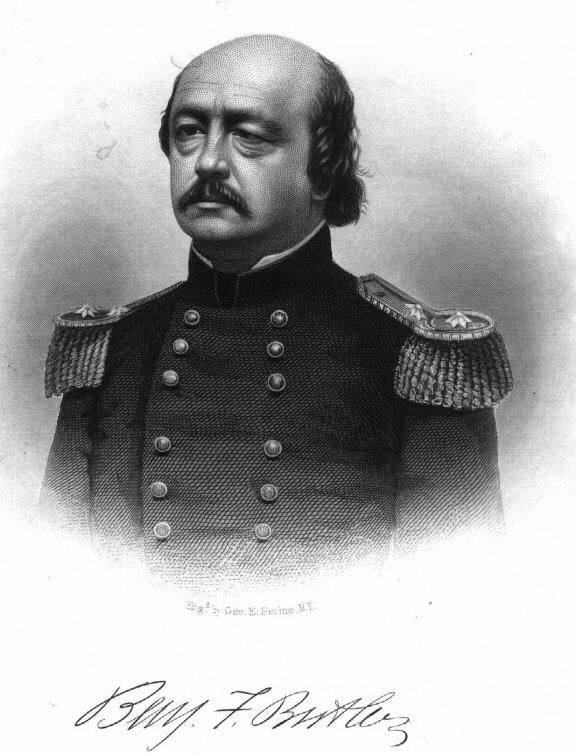 Mean
while, General Benjamin Butler was forming a black regiment in New
Orleans called the "Louisiana Native Guard" in August 1862. Butler was
Lincoln's aid and had the authority to muster the first black regiment
into the Union Army.
Mean
while, General Benjamin Butler was forming a black regiment in New
Orleans called the "Louisiana Native Guard" in August 1862. Butler was
Lincoln's aid and had the authority to muster the first black regiment
into the Union Army.
By the summer of 1862 Northerners were growing tired of being defeated by the South and fighting in the Civil War. The Union was running short of men. While stationed in New Orleans and short of men, Brigadier General Benjamin Butler turned to the free Black residents of New Orleans to help fight the war. New Orleans had a population of 150,000, of which 18,000 were slaves and 10,000 were free Blacks (James Parton, General Butler In New Orleans, P130). They were members of a Confederate regiment called “1st Louisiana Native Guard.” Free Blacks were enrolled by Andrew Jackson in the War of 1812 and again enrolled by Governor Moore in 1861(James Parton, General Butler In New Orleans, P134). They were the first Black regiment to be formed and they have the distinction of being the only Black regiment to be commanded by Black officers. Some were slave owners and some were mulattos. Would they switch sides and fight for the freedom of all Blacks? Butler had the following conversation with a group of them:
"But," I said, "I want you to answer me one question. My officiers, most
of them, believe that negroes won't fight."
"Oh, but we will, "came from the whole of
them.
"You seem to be an intelligent man, "said
I, to their spokesman;
"Answer me this question: I have found
out that you know just as well what this war is about as I do, and if
the United States succeed in it, it will put an end to slavery." They
all looked assent.
"Then tell me why some negroes have not
in this war struck a good blow somewhere for their freedom? "General,
will you permit a question?" "Yes."
"If we colored men had risen to make war
on our masters, would not it have been our duty to ourselves, they being
our enemies, to kill the enemy wherever we could find them? and all the
white men would have been our enemies to be killed?"
"I don't know but what you are right," said I. "I
think that would be a logical necessity of insurrection."
"If the colored men had begun such a war as that, General,
which general of the United States army should we have called on to help
us fight our battles?" That was unanswerable.
"Well," I said, "why do you think that your men will fight?"
"General we come from a fighting race. Our fathers were
brought here slaves because they were captured in war, and in hand to
hand fights, too. We are willing to fight. Pardon me, General, but the
only cowardly blood we have got in our veins is the white blood."...
“Better soldiers never shouldered a musket. They were intelligent, obedient, highly appreciative of their position, and fully maintained its dignity. They easily learned the school of soldier. I observed a, very remarkable trait about them. They learned to handle arms and to march more readily than the most intelligent white men. My drillmaster could teach a regiment of negroes that much of the art of war sooner than he could have taught the same number of students from Harvard or Yale....
Again, their ear for time as well as tune was exceedingly apt; and it was wonderful with what accuracy and steadiness a company of negroes would march after a few days' instruction...
Again, white men, in case of sudden danger, seek safety by going apart each for himself. The negroes always cling together for mutual protection. “
Major-General Benjamin F. Butler
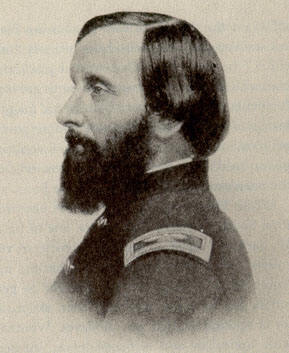 Butler
actions opened the door for the First South Carolina Colored Volunteers
to reform and was commanded by another abolitionist, Colonel T. W.
Higginson who was also a "secret six" supporter of John Brown's
raid. The First South
Carolina Colored Volunteers called themselves "The Gospel Army."
Butler
actions opened the door for the First South Carolina Colored Volunteers
to reform and was commanded by another abolitionist, Colonel T. W.
Higginson who was also a "secret six" supporter of John Brown's
raid. The First South
Carolina Colored Volunteers called themselves "The Gospel Army."
"It used to seem to me that never since Cromwell's time, had there been soldiers in whom the religious element held such a place. " A religious army," ' a gospel army," were their frequent phrases. "
Colonel T. W. Higginson
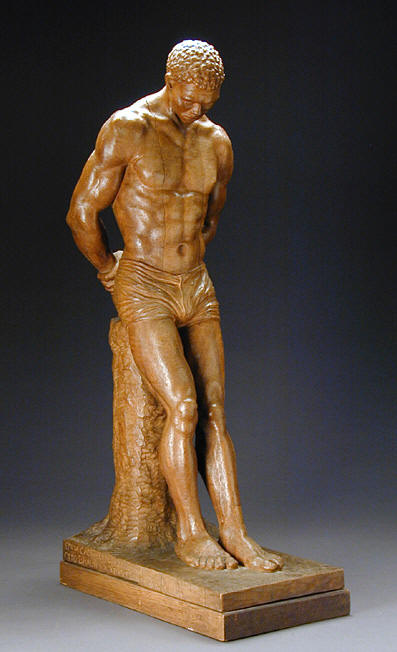 "In
speaking of the military qualities of the blacks, I should add, that the
only point where I am disappointed is one I have never seen raised by
the most incredulous newspaper critics, - namely, their physical
condition. To be sure they often look magnificently to my
gymnasium-trained eye; and I always like to observe them when bathing, -
such splendid muscular development, set off by that smooth coating of
adipose tissue which makes them, like the South-Sea Islanders, appear
even more muscular than they are."
"In
speaking of the military qualities of the blacks, I should add, that the
only point where I am disappointed is one I have never seen raised by
the most incredulous newspaper critics, - namely, their physical
condition. To be sure they often look magnificently to my
gymnasium-trained eye; and I always like to observe them when bathing, -
such splendid muscular development, set off by that smooth coating of
adipose tissue which makes them, like the South-Sea Islanders, appear
even more muscular than they are."
Col. T. W.
Higginson,
First South Carolina Volunteers
T. W. Higginson, Army Life in a Black Regiment, p55
In March of 1863 General Butler met with President Lincoln to discuss the Negro problem. The Emancipation Proclamation had taken effect and Lincoln was contemplating what to do with the newly freed slaves. He supported African Colonization as an answer to the Negro problem. The States however had organized 5 black regiments. There were 3 Louisiana regiments, one in Kansas and one in South Carolina. At this time both the 1st South Carolina Volunteers and the 1st Kansas Colored Volunteers had proven themselves in battle. Butler mustered the Louisiana Native Guard into the US Army on August 22, 1862 and was therefore experienced with arming Negroes. General Ben Butler was of his own political party and was an aid to the President.
"We then talked of a favorite project he had of getting rid of the negroes by colonization, and he asked me what I thought of it. I told him that it was simply impossible; that the negroes would not go anyway, for they loved their homes as much as the rest of us, and all efforts at colonization would not make a substantial impression upon the number of negroes in the country."
“ Reverting to the subject of arming the negroes, I said to him that I thought it might be possible to start with a sufficient army of white troops, and, avoiding a march which might deplete their ranks by death and sickness, to take them in ships and land them somewhere on the Southern coast. These troops could then come up through the Confederacy, gathering up negroes, who could be armed at first with arms that they could handle, so as to defend themselves and aid the rest of the army in case of rebel charges upon it. In this way we could establish ourselves down there with an army that would be a terror to the whole South.”
“ He asked me what I would arm them with. I told him John Brown had intended, if he got loose in the mountains of Virginia, to arm his negroes with spears and revolvers; and there was a great deal in that. "
" That is a new idea, General," said he.
"No, Mr. President," I answered, "it is a very old one. Fathers of these negroes, and some of the negroes themselves, fought their battles in Africa with no other weapon, save a club. Although we have substituted the bayonet for the spear, yet as long as the soldier can shoot he is not inclined to use the bayonet. "
General Butler
YouTube: Abraham Lincoln - A Tribute (Ashokan Farewell)
On May 22, 1863 The War Department established Bureau of Colored Troops (U.S.C.T.) and launched aggressive campaign to recruit black soldiers. By the end of the war there was over 130,000 black soldiers in the field at once. Over 130 regiments representing 7 Cavalry (7,000 men), 120 Infantry (100,000 men), 12 Heavy Artillery (12,000 men) and 10 companies of Light Artillery (1,300 men).
YouTube: Rough Side Of The Mountain
Will the slave fight? If any man asks you, tell him no. But if any one asks you will a Negro fight, tell him Yes!” Geoferey C. Ward
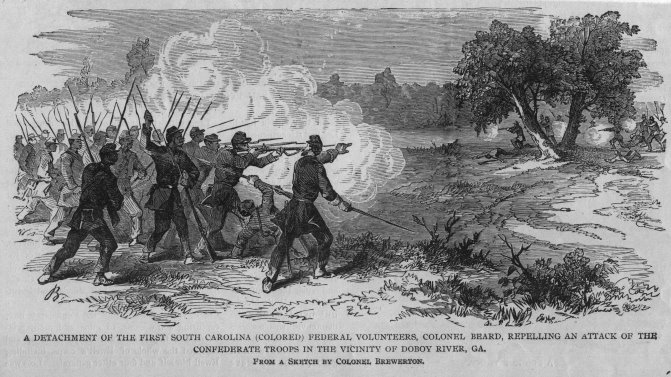
YouTube: Glory (1989) part 9, First Battle
Die in De Field
Oh what a you say,
seek-ers,
Oh what a you say, seek-ers,
Oh what a you say,
seek-ers
A - bout dat Gos - pel war.
what a you say, broth
- ers,
what a you say, broth - ers
Oh what a you say, broth -
ers
A - bout dat Gos - pel war,
An' I will die_ in de
fiel',
will die_ in de fiel',
will die_ in de fiel',
will
die_ in de fiel'
I'm on my journey home
Sing it ov-ah I home
“The Negro in the American Rebellion“ by William Wells Brown is the best and most reliable primary source for black Civil War history. It was written by a “man of the times” and a former slave. He admitted that he was neither historian nor writer, however modern editors disagree. His work is highly thought of. Brown documented the part Blacks played in the Civil War. He included articles and letters in his book that he collected during the Civil War He published his book two years after the war ended in 1867. Brown's view of the Civil War was unique and much of his work is published here..
While living in St. Louis as a slave, he worked for Lovejoy, an abolitionist. He escaped from his owner in St. Louis and became a conductor on the Underground Railroad as well as a great anti-slavery orator. He was the first black writer and wrote a book called “Clottel, the Presidents Daughter.” Apparently he had to write it in England since it revealed the intimate relationship between Thomas Jefferson and a mulatto slave woman. Brown wrote the first African American History book "The Black Man: His Antecedents, His Genius, and His Achievements in 1863."
"The siege of Washington, N.C., had carried consternation among the planters of the surrounding country, and contrabands were flocking in by hundreds. when, just at day-break one morning, a band of seventeen came to the shore, and hailed the nearest gunboat."
Black preachers played the leadership role in traditional black communities. The preacher "Big Bob" led his flock in battle. They escaped from slavery, then fought behind enemy lines for the Union Army. His story was published in , "The Negro in the American Rebellion" by William Wells Brown in 1867.
Black Civil War soldiers were former slaves and free men. This black soldier from Illinois supported the theme that they believed they were the Children of Israel, when he gave this note to the widow of his fallen white officer.
"Allow me to say, that although a Colored man, a private in the 29th, I found in Colonel Bross a friend, one in whom every member of the regiment placed the utmost confidence, for, and with whom, each one would help defend the country to the end...He was loved by every one, because he was a friend to every one.
Weep not for him who was one of God's chosen ones, who tried to deliver his people out of Egypt."
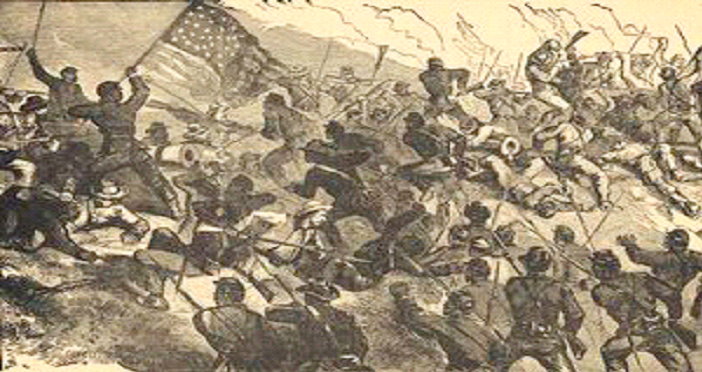
On May 27, 1863 the first large battle that included a Black regiment
occurred at Port Hudson Louisiana. Butler had mustered them into Union
service making them the first Black regiment to service the Union and
the only Black regiment to have Black officers. Most people believed
that they would not fight. Their leader replied to Butler: "General
we come from a fighting race. Our fathers were brought here slaves
because they were captured in war, and in hand to hand fights, too. We
are willing to fight. Pardon me, General, but the only cowardly blood we
have got in our veins is the white blood."
" From " The New-York Tribune," June 8, 1863: -"Nobly done, First Regiment of Louisiana Native Guard! Though you failed to carry the rebel works against overwhelming numbers, you did not charge and fight and fall in vain. That heap of six hundred corpses, lying there dark and grim and silent before and within the rebel works, is a better proclamation of freedom than even President Lincoln's. A race ready to die thus was never yet retained in bondage, and never can be. Even the Wood copperheads, who will not fight themselves, and try to keep others out of the Union ranks, will not dare to mob negro regiments if this is their style of fighting. “
W. W. Brown, The Negro in the American Rebellion, p175
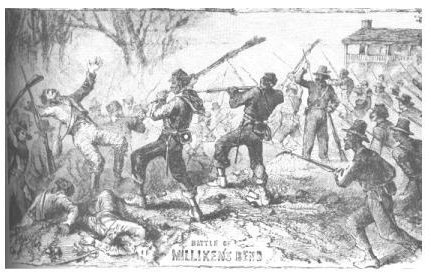
Confederate General McColloch was defeated by black troops at The Battle
of Milliken’s Bend:
At Millikens Bend on June 7, 1863, some Illinois cavalrymen sneered, "A man ud be a dam fool to try to make soldiers out ah niggers. . . . Any one ough to Know a nigger wont fight: they'r running now. before they seen a reb. . . . We will show them how it is done if we find any of them." Several minutes later the Illinois horsemen raced past in retreat, pursued closely by the Confederates. The black company then rose up and delivered a volley that drove the Rebels back and saved the day."
"The white or true Yankee portion ran like whipped curs almost as soon as the charge was ordered." while the blacks resisted with "considerable obstinacy," yet they could not hold the levee."
General McColloch
( J. T. Glatthaar, Forged in Battle)
On July 18, 1863 the 54th Massachusetts attacked Fort Wagner (depicted in the movie "Glory") and W. H. Carney was awarded a Congressional Medal of Honor many years later. A Flag belonging to the 54th Massachusetts was the first Christian flag to enter the Civil War.
“This is the first Christian banner that has gone into our war. By a strange, and yet not strange, providence, God has mistic this despised race the bearers of his standard. They are thus the real leaders of the nation."
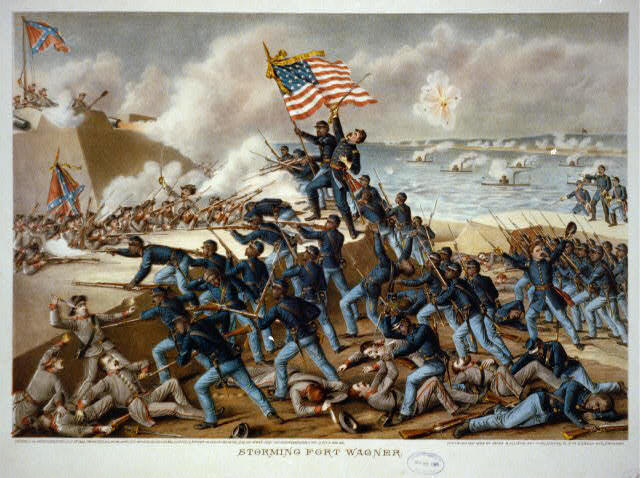
Storming Fort Wagner
by Louis
Kurz & Alexander Allison 1893
"I lived next door to a black Civil War re-enactor for ten years
and I refused to believe that Blacks fought in the Civil War. I was
trained to believe that slaves accepted slavery and were freed by
whites. After watching the movie Glory twenty years ago, I researched
the subject and was convinced that I had to teach the truth."
Rev. John A. White Jr.
Movie "Glory" used a Soldiers Prayer from the Gospel Army
The Glory Film - The Battle Hymn of The Republic
By 1864 The Civil War was becoming less about restoring the Union and being more about freedom for slaves
YouTube: The Battle Cry of Freedom - Tom Roush
In March 1864 General Grant was put in charge of the Union Army. General Grant organized a coordinated invasion of the South. General Sherman’s Army invaded Georgia and marched towards Atlanta. General Sigel invaded the Shenandoah Valley. General Crook and General Averill mission was to destroy railroad supply lines in West Virginia and General Banks was sent to capture Mobil Alabama. General Grant and General Meade attacked General Robert E. Lee’s Army of Northern Virginia. Butlers mission was to invade the Confederate capital of Richmond Virginia with his Army of the James.
General Butler was given command of the Army of the James in April 1864. The Army of the James was composed of 33,000 troops, 13,000 or 40% of which were black. On May 5, 1864 Butler traveled down the James by means of the Navy and established his head quarters at a small village called Bermuda Hundred. This was the same day that General Grant engaged Confederate General Robert E. Lee at the Battle of the Wilderness.
YouTube: US Civil War Music Video
Before attacking Richmond, Butler must first attack Petersburg to destroy an important railway supply to Richmond. Butler however, had to contend with the Confederate Army led by Confederate General Beauregard. His subordinate, guarded Petersburg was General Pickett who led YouTube: Pickett’s Charge at the Battle of Gettysburg.
“The very name of Butler struck terror, or horror, into Confederate generals. When Pickett heard of a movement of the Army of the James, the Southern Gettysburg hero wrote to Adjutant General Cooper:
Butler's plan, evidently, is to let loose his swarm of blacks upon our ladies and defenseless families, plunder and devastate the country. Against such a warfare there is but one resource to hang at once every one captured belonging to the expedition, and afterwards every one caught who belongs to Butler's department. Let us come to a definite understanding with these heathen at once. Butler cannot be allowed to rule here as he did in New Orleans. His course must be stopped."
R. S. Holzman, Stormy Ben Butler, p137
Milton Holland won a Congressional Medal of Honor at the Battle of Petersburg.
One thing that I must mention which attracted the attention of the whole division. It was that brave and daring but strange personage that rides the white charger. We could see him plainly riding up and down the rebel lines, could hear him shouting from the top of his voice to stand, that they had only niggers to contend with. This peculiar personage seems possessed with supernatural talent. He would sometimes ride his horse at lightning speed, up and down his lines amid the most terrific fire of shot and shell. But when the command was given to us, "Charge bayonets! Forward double quick!" the black column rushed forward raising the battle yell, and in a few moments more we mounted the rebel parapets. And to our great surprise, we found that the boasted Southern chivalry had fled. They could not see the nigger part as the man on the white horse presented it. We captured here one gun and caisson.
Milton M. Holland
Orderly
Sergeant
Co. C, 5th USCI
Petersburg Virginia, July 24, 1864
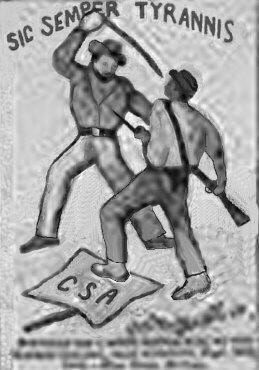 By
the fall of 1864, 1 out of 10 Union Civil War soldiers were black. Few
people however believed that all men were created equal and many wanted
an end to the Civil War. By September 29, 1864 President Lincoln was not
expected to win re-election in November 1864 over his pro-slavery
opponent. Butler was Lincoln's first choice as running mate but Butler
chose to stay on the battlefield.
By
the fall of 1864, 1 out of 10 Union Civil War soldiers were black. Few
people however believed that all men were created equal and many wanted
an end to the Civil War. By September 29, 1864 President Lincoln was not
expected to win re-election in November 1864 over his pro-slavery
opponent. Butler was Lincoln's first choice as running mate but Butler
chose to stay on the battlefield.
In the Declaration of Independence, Thomas Jefferson wrote: "We hold these truths to be self-evident, that all men are created equal." At Gettysburg, President Lincoln said that we are: "dedicated to the proposition that all men are created equal." However, in 1864, most Americans believed in racism.
General Butler needed a big victory by black troops to affirm that the Civil War was worth the cost and could be won. "Hence the attack by the negro column. on Newmarket Heights."
At New Market Heights black troops took on the majority of Confederate troops that defended Richmond Virginia, the Confederate capitol. They were on the right flank of the white Union army that were capturing practically empty Confederate Fort Harrison. The outer defense of Richmond was collapsed. For heroism at New Market Height's 14 Congressional Medals of Honor were given to black troops. These were the first non-white medal recipients of the nations highest honor and the event is the most honored African American event. This congressional act confirmed national dedication to the phrase "all men are created equal."
"After that in the Army of the James a negro regiment was looked upon as the safest flanking regiment that could be put in line."
Major-General Benjamin F. Butler
“ If you really wanted to find one significant rallying point for all the achievements of all blacks in all wars, this is the battle.”
Colonel William A. DeShields
The United States Park Service "USCT's at New Market Heights" Website
RICHMOND
NATIONAL BATTLEFIELD
More about General Butler: About General Butler
By the winter of 1864 the flanking performance of Black troops was becoming widely known. Like New Market Heights, black troops were placed on the right flank of the Union Army at the Battle of Nashville.
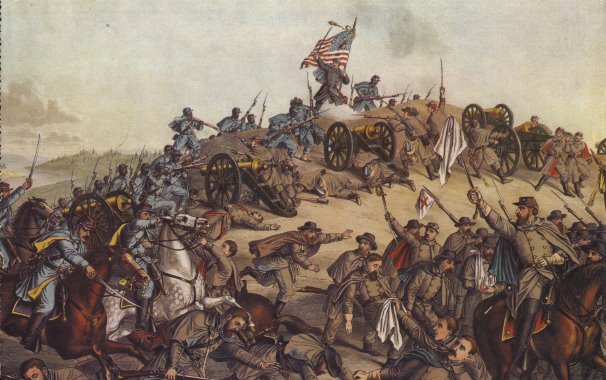
Battle of Nashville by Louis Kurz &
Alexander Allison 1893
"In the late stages of the war, the USCT really began to make its presence felt. Nearly one in every eight soldiers in the siege of Peter's burg was black. and at the Battle of Nashville, where Maj. Gen. George H. Thomas 's troops crushed the Confederate Army of Tennessee and put a halt to Lt. Gen. John Bell Hood's Tennessee invasion, black forces played a major role despite their comparatively small size. On the first day of fighting, the two black brigades attacked the Confederate right to draw resources away from the main Federal thrust on the Rebel left flank, which was successful. During the second day, black and white troops swarmed up the slick slopes of the Confederate position on Overton Hill. "I can hear the voices the officers as they called out, 'Close up those ranks,' " recalled an officer in the USCT, "as great gaps were made in them by howiitzer and grape shot guns loaded to the muzzle." Although they did not break the Confederate line, these troops again forced the Confederates high command to transfer men to its right, which weakened the left and facilitated its fall to Federal attackers. Black units sustained 630 casualties out of 3,500 men in the victory."
"When I went to the War, I was turning seventeen. I was in the Battle of Nashville, when we whipped old General Hood. I went to see my mistress on my furlough, and she was glad to see me. She said, 'You remember when you were sick and had to bring you to the house and nurse you?" And I told her, "Yes m, I remember. " And she said, "And now, you are fighting me?" I said, "No'm, I ain't fighting you. I'm fighting to get free. "
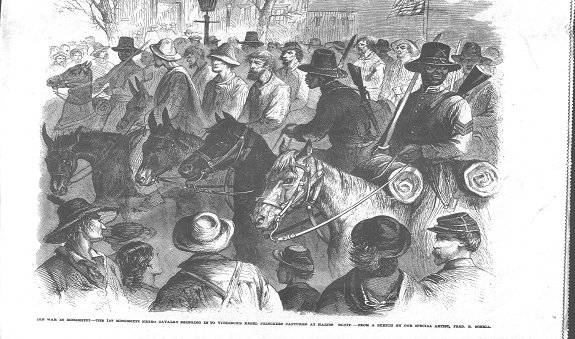
The 1st Mississippi Cavalry Bringing Into
Vicksburg Rebel Prisoners Captured At Haines Bluff, Frank Leslies
Illustrated, December 19, 1863
On December 10-29, 1864 Black troops fought at Saltville Virginia. They were Black Cavalry soldiers from Kentucky. Kentucky was a border state that was not under the influence of the Emancipation Proclamation. Black men were allowed to join the Union Army but their families remained in slavery. This is exceptional historical material (go to Saltville link) because it describes the action of a Black cavalry unit at the Battle of Saltville and also describes the experience of a soldiers widow after he was killed at Saltville. This material could not be abbreviated.
Luke 9:48 - "for he that is least among you all, is the greatest."
Glory (1989 Movie) - "You watch who you call a nigga."
This Rebel view is supported by the tenacious fighting style of black Civil War soldiers at the Big Black River.
“In late 1864 a railroad bridge carried needed Confederate supplies over the Big Black River in Mississippi. The bridge was guarded by over 300 Rebels (one regiment). Large union forces had failed to take the bridge in several occasions when Maj. J. B. Cook and his 3rd U.S. Colored Cavalry “tried their hands”. With only 2 companies of black men (150 men), Cook routed the Confederates fighting parts of the battle “hand to hand”. It was declared “one of the most daring and heroic acts of the war”.
J. T. Glatthaar, Forged in Battle, p152
YouTube: Pastor E.Dewey Smith Jr.-Climbing Jacob Ladder

On April 2, 1865 Black troops were among the first to enter Petersburg.
The next day, on April 3, 1865 Black troops in the 25th Corps
were the first to enter Richmond, the Confederate capital and
Chaplain Garland H.
White marched in front
of his regiment. Col. Draper led the black troops at New Market Heights
and was promoted to general. He places his black troops at the front of
the Union army when they entered Richmond. The 25th Corps
pursued Robert E. Lee’s Army and participated in the closing battle at
Clover Hill, April 9th, the day of Lee's surrender at Appomattox.
The 25th Corps was the largest black army assembled in American history.
“The night they drove old Dixie down (lyrics, YouTube)” is a song that represents the southern view of the day that slaves were liberated at Richmond Virginia the capital of the Confederacy.
“When the first Negro Congressmen were met with cold courtesies on every hand, Butler was quick to be on familiar terms with them. His solicitude for Negroes was so great that at a colored banquet in New Orleans, the master of ceremonies offered this well intended toast: "Here's to General Butler. He has a white face, but he has a black heart."
Stormy Ben Butler, R. S. Holzman, p205
“On
November 16, 1871, a group of unknown singers -- all but two of them
former slaves and many of them still in their teens -- arrived at
Oberlin College in Ohio to perform before a national convention of
influential ministers. After a few standard ballads, the chorus began to
sing spirituals -- "Steal Away" and other songs" associated with slavery
and the dark past, sacred to our parents," as soprano Ella Sheppard
recalled. It was one of the first public performances of the secret
music African Americans had sung in fields and behind closed doors.
"All of a sudden, there was no talking," says musicologist Horace Boyer.
"They said you could hear the soft weeping . . . and I’m sure that the
Jubilee Singers were joining them in tears, because sometimes when you
think about what you are singing, particularly if you believe it, you
can’t help but be moved." …Eventually, they would perform for presidents
and queens, tour the United States and Europe, and establish songs like
"Swing Low, Sweet Chariot" and "This Little Light of Mine" as a
cherished part of the nation’s musical heritage... "Every church wanted
the Jubilee Singers from that time on," wrote Maggie Porter. They sang
for Mark Twain, President Ulysses S. Grant, congressmen, diplomats.
"These singers," said one newspaper, "are doing a great work for
humanity."… Eventually they would tour Europe to universal acclaim and
sing for the royal families of Holland, Germany, and Britain. "They are
real Negroes," Queen Victoria wrote in her journal. "They come from
America and have been slaves. They sing extremely well together."… After
almost seven years of touring, the Jubilee Singers returned home. They
were honored by Fisk for raising the funds to complete Jubilee Hall and
save their school…But their contributions extended far beyond Fisk
University. They had introduced the world to the power of spirituals and
challenged racial stereotypes on two continents...More than 125 years
later, the Jubilee Singers of Fisk University continue the concert
tradition begun by that courageous original chorus of former slaves.”
PBS Online, The American
Experience, The Jubilee Singers
YouTube: Dorothy Norwood- I Still Have Joy
There were close to 200,000 black Civil War soldiers that fought in the United States Colored Troops in 400 battles. Fox's Regimental Losses is their official story.
FOX'S REGIMENTAL LOSSES CHAPTER VI
THE COLORED TROOPS
--HISTORY OF THEIR ORGANIZATION--
THEIR LOSSES IN BATTLE AND BY DISEASE
Information for this website is taken from my (150 page, 8.5x11) unpublished print on demand book "The Gospel Army." For a donation of $50 you can become a member of the Gospel Army Black History Group. As a member you will receive a copy of "The Gospel Army."
Silver plated reproductions of "The Butler Medal," 1 3/4" dia. are only awarded to individuals that believe in the nobility of this history and are determined to protect it.


him that "arming the Negroes" was a better idea.
Democrats (conservative party.) Butler was Lincoln's first choice as a running mate in the 1864 election, Butler chose to stay on the battlefield.
If you would like to join the Gospel Army or would like to see a presentation please drop me a line at: thegospelarmy@yahoo.com.
Check out thegospelarmy blogs at About.com:African-American History
The Promise Land
The N-word originally meant black
Lost History of New Orleans
My Baby’s Father on The Jerry Springer Show
The night they drove old Dixie down
The General behind President Lincoln
Slave Narratives, wasteful spending?
REPLY'S
Slave "Mind set"
The Mystic Years 1867-77
MAASAI Integrated Community Development Program
The Maasai of Kenya Africa are experiencing a devastating drought. The Gospel Army Black History Group is working with them to get there story out and preserve their culture.
The Gospel Army Black History Group, contact: thegospelarmy@yahoo.com
Copyright © 2006 The Gospel Army Black History Group. All rights reserved.
Revised: 09/23/12.
